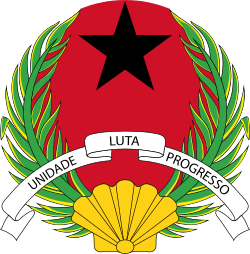Guinea-Bissau general election, 2014
| | |||||||||||||||||||||||
| |||||||||||||||||||||||
| |||||||||||||||||||||||
 |
| This article is part of a series on the politics and government of Guinea-Bissau |
|
|
Legislature |
|
Judiciary
|
General elections were held in Guinea-Bissau on 13 April 2014, with a second round for the presidential elections held on 18 May since no candidate received a majority in the first round. Several logistic problems and delays caused the elections to be repeatedly postponed, having initially been scheduled for 24 November 2013 and then 16 March 2014.[1] In the second round, José Mário Vaz was declared the president-elect with 62% of the vote.[2]
Background
The elections were the result of a military coup in 2012 cancelling the elections that year.[3] On 26 February 2014, the UN Security Council urged Guinea-Bissau's transitional government to abide by announced election plans, warning of sanctions against those opposing a return to constitutional order.
Former President Kumba Ialá died a few weeks before the elections.[4]
Electoral system
The President will be elected using the two-round system, whilst the 102 members of the National People's Assembly were elected using proportional representation from 27 multi-member constituencies.[5] Article 33 of Guinea-Bissau's Electoral Law prohibits the publishing of any opinion polls.[6]
Candidates and parties
Thirteen presidential candidates were confirmed by the High Court of Justice,[7] whilst eight candidates were rejected.[8]
The Court approved fifteen parties to contest the National People's Assembly election, but rejected applications from seven other parties; the National African Congress, the Guinean Civic Forum-Social Democracy, the Democratic Party for Development, the Guinean Democratic Movement, the Patriotic Movement, the Guinean League for Ecological Protection and the Party for Democracy, Development and Citizenship.[8]
Results
President
| Candidate | Party | First round | Second round | ||
|---|---|---|---|---|---|
| Votes | % | Votes | % | ||
| José Mário Vaz | PAIGC | 257,572 | 40.89 | 364,394 | 61.92 |
| Nuno Gomes Nabiam | Independent | 156,163 | 24.79 | 224,089 | 38.08 |
| Paulo Gomes | Independent | 65,490 | 10.40 | ||
| Abel Incanda | Party for Social Renewal | 43,890 | 6.97 | ||
| Mamadú Iaia Djaló | New Democracy Party | 28,535 | 4.53 | ||
| Ibraima Sory Djaló | National Reconciliation Party | 19,497 | 3.10 | ||
| Antonio Afonso Té | Republican Party for Independence and Development | 18,808 | 2.99 | ||
| Helder Vaz Lopes | Independent | 8,888 | 1.41 | ||
| Domingos Quadé | Independent | 8,607 | 1.37 | ||
| Aregado Mantenque Té | Workers' Party | 7,269 | 1.15 | ||
| Luis Nancassa | Independent | 7,012 | 1.11 | ||
| Jorge Malú | Independent | 6,125 | 0.97 | ||
| Cirilo Rodrigues de Oliveira | Socialist Party | 2,070 | 0.33 | ||
| Invalid/blank votes | 62,514 | – | 18,053 | – | |
| Total | 692,440 | 100 | 606,536 | 100 | |
| Registered voters/turnout | 775,508 | 89.29 | 775,508 | 78.21 | |
| Source: CNE, CNE | |||||
National People's Assembly
| Party | Votes | % | Seats | +/– |
|---|---|---|---|---|
| PAIGC | 281,408 | 47.98 | 57 | –10 |
| Party for Social Renewal | 180,432 | 30.76 | 41 | +13 |
| New Democracy Party | 28,581 | 4.87 | 1 | 0 |
| Democratic Convergence Party | 19,757 | 3.37 | 2 | +1 |
| Republican Party for Independence and Development | 17,919 | 3.06 | 0 | –3 |
| Union for Change | 10,803 | 1.84 | 1 | +1 |
| Guinean Patriotic Union | 10,919 | 1.86 | 0 | 0 |
| Resistance of Guinea-Bissau-Bafatá Movement | 9,502 | 1.62 | 0 | New |
| National Reconciliation Party | 7,903 | 1.35 | 0 | 0 |
| Manifest Party of the People | 4,101 | 0.70 | 0 | New |
| United Social Democratic Party | 4,048 | 0.69 | 0 | 0 |
| Workers' Party | 3,659 | 0.62 | 0 | 0 |
| Socialist Party | 3,480 | 0.59 | 0 | 0 |
| Social Democratic Party | 2,302 | 0.39 | 0 | 0 |
| Democratic Social Front | 1,710 | 0.29 | 0 | 0 |
| Invalid/blank votes | 100,352 | – | – | – |
| Total | 686,876 | 100 | 102 | +2 |
| Registered voters/turnout | 775,508 | 88.57 | – | – |
| Source: CNE (seats), CNE (votes) | ||||
References
- ↑ Guinea-Bissau postpones post-coup election until March Reuters, 15 November 2013
- ↑ "Vaz elected President of Guinea-Bissau". Voice Of America. 20 May 2014.
- ↑ "Electoral Calendar - international elections world elections". Retrieved 2011-05-12.
- ↑ Ex-president of Guinea-Bissau dies SBS, 4 April 2014
- ↑ Electoral system IPU
- ↑ "Holding of Elections Brings Guinea Bissau Closer to Constitutional Normalcy" (PDF). European Union Election Observation Mission. Hotel Azalai, Bissau. 14 April 2014.
- ↑ Look, Anne (26 March 2014). "Guinea Bissau: Tight Timeline As Nation Prepares April 13 Polls". allAfrica. Retrieved 14 April 2014.
- 1 2 GUINÉ-BISSAU: SUPREMO “CHUMBA” OITO CANDIDATURAS PRESIDENCIAIS E SETE PARTIDOS A Nação, 16 March 2014

